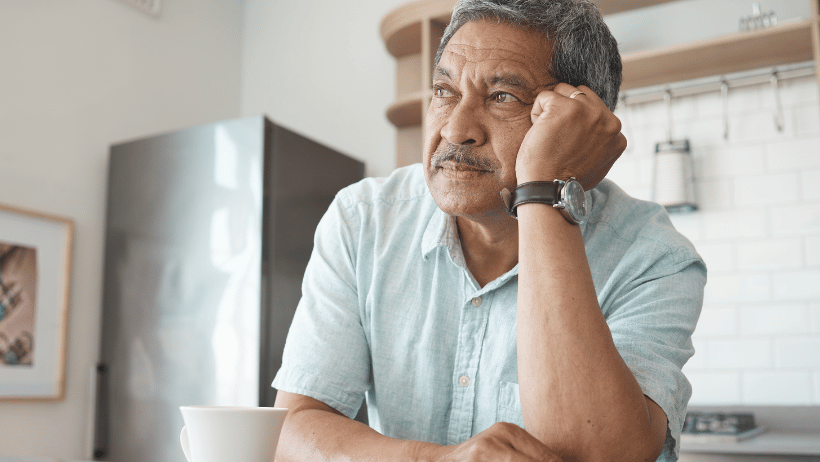Having a strong social network as you age can actually be beneficial for your health. On the other hand, a lack of socialization, or social frailty, can be detrimental to your well-being and overall health. Social frailty refers to the decline in social relationships and networks, resulting in reduced social support and isolation. It impacts the psychological, emotional, and physical aspects of a loved one's well-being.
Let's explore social frailty, identify its risk factors, and discuss the potential risks associated with this condition.
What Is Social Frailty?
Social frailty describes the decline in a loved one's social interactions, including the deterioration of their social networks and relationships.
Physical frailty primarily focuses on the decline in physical health and mobility. However, social frailty emphasizes the loss of an social connections and support systems. But physical frailty and social frailty may go hand in hand. As a loved one faces health challenges, they not be able to participate in the social activities they once enjoyed.
If a loved one is socially frail, you might notice the following signs:
- Reduced attendance at social activities
- Diminished social interaction
- Increased feelings of loneliness and isolation
- Limited or impaired communication skills
- Few close relationships
RELATED CONTENT: Unexpected Causes of Senior Isolation
Risk Factors for Social Frailty
Many things can impact someone's ability to socialize. For example, access to a car and the ability to drive safely could be a determining factor in someone attending social events. But there are many things that contribute to social frailty.
Here are some of the most common risk factors of social frailty for adults over age 65.
- Advanced Age: With age, individuals may experience the loss of family and friends, making it more difficult to maintain social connections. Additionally, physical limitations or health issues can restrict their ability to participate in social activities, leading to social isolation.
- Widowhood or Divorce: The loss of a spouse through death or divorce can significantly impact an older adult's social network. The absence of a life partner may lead to loneliness and isolation, especially if they lack a supportive social circle.
- Physical Health Decline: Chronic disease, mobility limitations, and disabilities can restrict an older adult's ability to engage in social activities. The resulting reduced mobility may hinder their access to social events, leading to social isolation and declining social interactions.
- Cognitive Impairment: Cognitive decline, such as Alzheimer's disease or dementia, can affect a loved one's ability to maintain social relationships. Memory loss and difficulty with communication may lead to social withdrawal and disengagement.
- Economic Factors: Financial difficulties can exacerbate social frailty. Limited financial resources may restrict someone's ability to participate in social activities or access transportation, thereby reducing their social interactions.
RELATED CONTENT: Proactive Ways to Deal with Depression in Seniors
Health Impacts of Social Frailty
Social frailty can actually have a great impact on the overall health of older people. Here are some of the health impacts of social frailty.
- Loneliness and Isolation: Social frailty increases the risk of loneliness and isolation, which can impact physical health. It can increase risk for depression, anxiety, and cognitive decline.
- Declining Cognitive Health: Social connections and interactions are essential for maintaining cognitive function. Talking with others helps build and maintain connections in the brain.
- Poor Physical Health Outcomes: Lack of socialization and social support have been linked to physical health issues. Older adults experiencing social frailty may have higher rates of heart problems, compromised immune function, and increased mortality risk.
- Reduced Quality of Life: Limited social interactions and diminished support networks can lead to feelings of unhappiness. Seniors who lack socialization may also feel a diminished sense of purpose and fulfillment.
- Increased Healthcare Needs: Socially vulnerable individuals may delay seeking medical attention. They may not be able to find transportation or are hesitant to reach out for help, resulting in untreated health conditions that worsen over time.
Overall, a strong sense of community and belonging is a key to improving health and staying healthy as we age.
Addressing Social Frailty in Older Adults
Recognizing and addressing social frailty in the elderly is essential for promoting healthy aging. If you or a loved one experiences social frailty, here are some things that you can do to help.
- Engage in the Community: Encourage older adults to participate in community activities, senior centers, or volunteer work. This can foster social connections and combat isolation. They may need you to go with them at first until they feel more comfortable.
- Use Technology: Technology can connect individuals with family and friends through social media platforms, video calls, or online communities. Technology can also provide resources to help bridge the gap and reduce social isolation.
- Take Advantage of Resources: There are many programs available that provide companionship, transportation assistance, and access to healthcare services. All of this support can help combat social frailty by ensuring individuals have the necessary resources.
- Build Intergenerational Relationships: Interactions between different age groups can promote social connections and provide mutual benefits. Think of mentorship programs or family gatherings with multiple generations.
RELATED CONTENT: Ways to Senior Socialize and Avoid Isolation
Social frailty poses significant risks to the well-being and health of the elderly population. Understanding the social frailty and addressing it is crucial for promoting healthy aging.
At Caring Senior Service, our professional caregivers can provide meaningful companionship, among other services, to help engage your loved one in social activities and meaningful conversation. Reach out to your local team to learn more.

